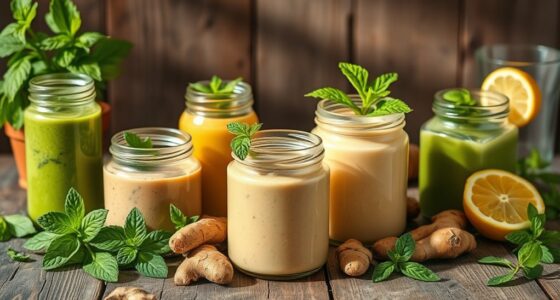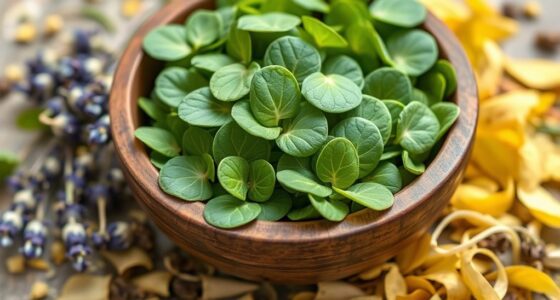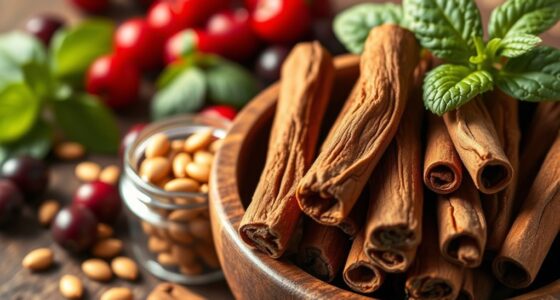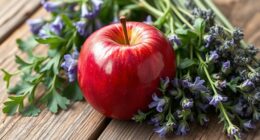Herbs like beetroot and cordyceps can boost your exercise performance by enhancing endurance, improving oxygen use, and supporting faster recovery. Beetroot increases nitric oxide for better blood flow and stamina, while cordyceps boost energy at the cellular level and reduce fatigue. Other herbs like ginseng and milk thistle also offer benefits for mental focus and detoxification. Incorporating these herbs into your routine can elevate your training, and learning more will help you optimize your herbal strategies.
Key Takeaways
- Beetroot enhances endurance by improving nitric oxide production, increasing oxygen efficiency, and reducing exercise fatigue.
- Cordyceps boosts stamina by increasing ATP production and supporting mitochondrial function.
- Combining herbs like ginseng, ashwagandha, and milk thistle can optimize energy, recovery, and detoxification.
- Proper herbal preparation, dosage, and consultation are essential to maximize benefits and ensure safety.
- Scientific research confirms herbs’ roles in improving oxygen utilization, reducing fatigue, and supporting athletic performance.
The Role of Herbs in Athletic Performance
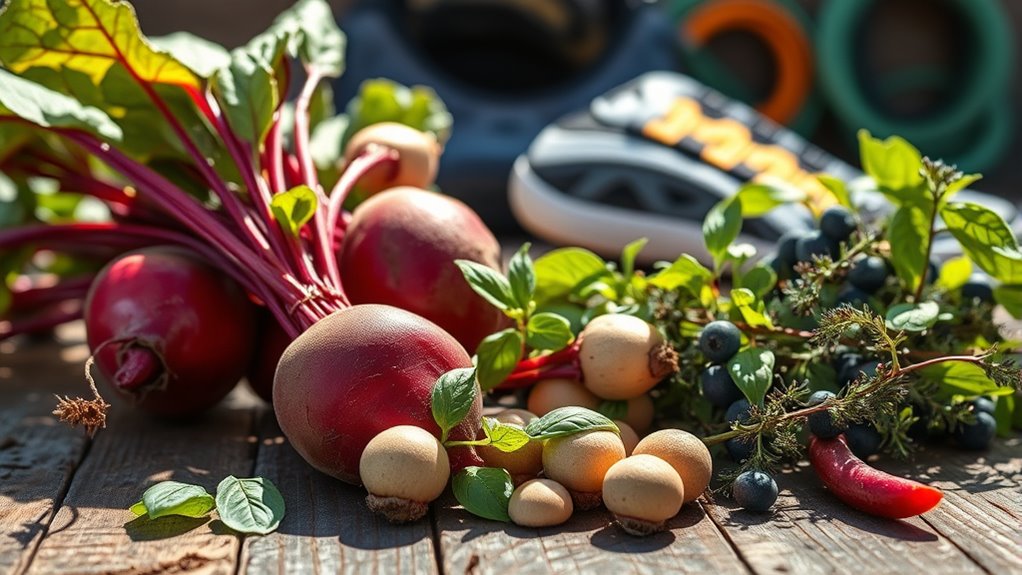
Herbs have gained popularity among athletes because they can naturally boost performance and support recovery. Understanding herbal dosage guidelines is essential to maximize benefits safely. Many athletes turn to traditional medicine perspectives, which emphasize balance and holistic health, to guide their use of herbs. These perspectives highlight the importance of proper preparation and dosage to avoid adverse effects. For example, adaptogenic herbs like ginseng and ashwagandha are used for stamina and stress reduction, but their effectiveness depends on correct dosages. Following traditional practices ensures you use herbs responsibly and effectively. Using herbs with informed guidance helps you enhance your athletic performance while minimizing potential risks. Additionally, cultivating a creative practice can help athletes develop better focus and resilience, which are vital for consistent training and recovery.
Beetroot: Nature’s Endurance Booster
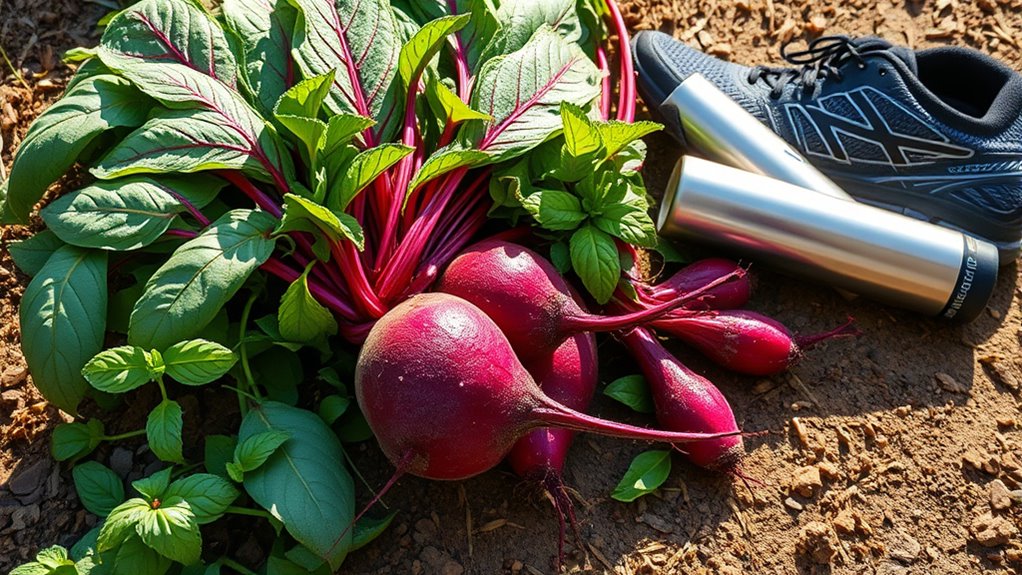
Beetroot can boost your endurance by improving how efficiently your body uses oxygen during exercise. It also helps reduce fatigue, so you can push through your workouts longer. Incorporating beetroot into your routine might be just what you need to enhance performance naturally. Additionally, its hydration benefits can help prevent dehydration-related fatigue during prolonged activity. Using natural paint sprayers for maintenance or home projects ensures safer and healthier environments, aligning with a holistic approach to well-being.
Enhances Oxygen Efficiency
Have you ever wondered how some athletes push through their toughest workouts with remarkable ease? The secret often lies in improved oxygen efficiency. Beetroot contains nitrates that convert to nitric oxide, helping your body use oxygen more effectively. When your oxygen efficiency increases, your muscles get the fuel they need without overexertion. This process also supports better breath control, allowing you to breathe more steadily and deeply during exercise. As a result, you can sustain higher intensities longer and recover faster. By enhancing how efficiently your body uses oxygen, beetroot helps you maximize your endurance and performance. It’s like giving your lungs and muscles a boost, so you can go further with less fatigue and greater control over your breathing throughout your workout.
Lowers Exercise Fatigue
When you’re pushing your limits during exercise, fatigue can set in quickly, making it harder to maintain performance. Beetroot, known as a natural endurance booster, helps lower exercise fatigue by improving blood flow and oxygen delivery. Its nitrates support herbal detoxification, clearing toxins that may contribute to tiredness. Additionally, beetroot can promote better recovery by supporting herbal sleep aids, helping you rest and recharge faster. This improved recovery reduces the feeling of exhaustion after workouts. Incorporating beetroot into your routine can extend your stamina and sustain energy levels longer. By reducing fatigue, you’ll find it easier to push through tough sessions and stay consistent with your training goals. Modern athletic performance techniques, such as personalized training programs and advanced recovery tools, are also enhancing athletic performance through innovative methods. Beetroot truly helps you perform at your best, longer, as it can enhance nutrient delivery to muscles, further supporting endurance. Proper recovery strategies and implementing proper hydration strategies alongside beetroot supplementation can further optimize your stamina and recovery.
Cordyceps: Fungi for Energy and Recovery

Cordyceps, a type of medicinal fungi, are renowned for their ability to boost energy and enhance recovery during physical activity. When you incorporate cordyceps into your routine, you may notice improved stamina, allowing you to push harder and longer. These fungi support fungi recovery by reducing fatigue and muscle soreness, helping you bounce back faster after intense workouts. Scientific studies suggest that cordyceps increase ATP production, which fuels your muscles and boosts oxygen utilization. This means you can sustain higher performance levels with less exhaustion. Additionally, some research indicates that cordyceps may support immune function and overall health, further benefiting your training. Their role in enhancing mitochondrial function contributes to increased energy levels and recovery efficiency. Incorporating evidence-based approaches can help optimize your performance and recovery strategies. Regular consumption of cordyceps may also promote antioxidant activity, which helps reduce oxidative stress caused by intense exercise. Whether you’re training for a marathon or recovering from a tough session, cordyceps can be a natural way to elevate your endurance and speed up recovery, making them a valuable addition to your fitness regimen.
Other Herbs That Support Fitness Goals

Beyond cordyceps, several other herbs can support your fitness goals by enhancing energy, stamina, and recovery. For example, herbs like milk thistle aid in herbal detox, helping your body eliminate toxins that impair performance. Ginseng is known to boost endurance and mental clarity, supporting sustained effort during workouts. Incorporating meditation techniques alongside herbal supplements can improve focus and reduce stress, which benefits recovery and overall progress. These herbs may also help reduce inflammation and promote muscle repair. Additionally, practicing mindfulness during exercise can enhance your awareness of physical sensations and improve your overall workout quality. Engaging in herbal detox routines can further help in flushing out impurities and optimizing your body’s natural healing processes. Understanding the role of AI in healthcare technology can also inform your approach to selecting effective supplements and recovery strategies. Utilizing herbal supplements with a clear understanding of their effects can enhance safety and effectiveness. Incorporating herbal remedies into your routine may also support your immune system, helping you stay healthy during intense training periods. By integrating herbal detox routines and mindful practices into your routine, you optimize both physical and mental readiness. Keep in mind, consistency is key, and combining these herbs with proper rest and nutrition will amplify your fitness results.
Scientific Insights Into Herbal Benefits for Athletes
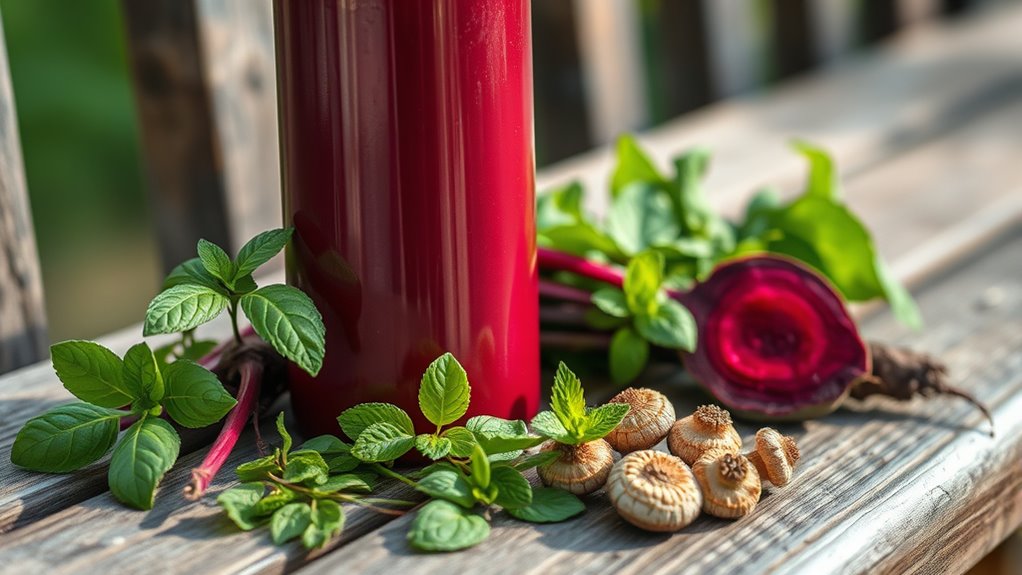
Scientific studies show that certain herbs can help you use oxygen more efficiently during exercise, boosting your overall performance. They also help reduce fatigue, so you can push harder for longer periods. Additionally, these herbs may increase your endurance capacity, allowing you to train more effectively over time. Moreover, understanding the secrets of global intelligence can offer insights into how information about these herbs is gathered and utilized in different regions. As AI-powered tools evolve, they can assist in analyzing herbal efficacy data to optimize athletic performance. Recognizing the customization of tuning options available for vehicles highlights the importance of tailored approaches, similar to personalized herbal regimens for athletes. Incorporating brewing techniques from different methods can also be adapted to enhance the extraction and potency of herbal compounds to maximize their benefits. Developing a deeper self-awareness about individual responses to herbal supplements can further refine and personalize performance strategies.
Enhanced Oxygen Utilization
Herbs have gained attention for their ability to improve oxygen utilization, which is essential for athletic performance. Enhanced oxygen delivery helps your body efficiently use nutrients, supporting better endurance and faster muscle recovery. When herbs boost oxygen utilization, they also promote nutrient absorption, ensuring your muscles get what they need to perform at their best. You might notice these effects through:
- Increased stamina during workouts
- Faster recovery times after intense exercise
- Improved blood flow and oxygen delivery
- Enhanced energy levels and reduced fatigue
Reduced Exercise Fatigue
Enhanced oxygen utilization helps your muscles operate more efficiently during exercise, but it’s not the only factor that influences fatigue. Herbs like cordyceps and beetroot can also reduce exercise-related tiredness by supporting muscle recovery and maintaining mental focus. These herbs may help delay the onset of fatigue by decreasing lactic acid buildup and replenishing energy stores, so you can train harder and longer. Additionally, improved mental focus keeps you alert and in control, preventing mental exhaustion that often accompanies physical fatigue. Incorporating these herbs into your routine can help you push through tough workouts with less perceived effort, allowing your body to recover faster afterward. By addressing both physical and mental fatigue, these herbal strategies enable more consistent and effective training sessions.
Increased Endurance Capacity
Research shows that certain herbs can substantially boost your endurance by improving how your body utilizes oxygen and sustains energy during prolonged exercise. Herbs like Cordyceps and beetroot are known to enhance oxygen uptake and reduce fatigue, allowing you to train longer and harder. To maximize benefits safely, follow dosage guidelines to avoid herbal toxicity, which can occur with excessive use. Always consult with a healthcare professional before starting new herbal supplements.
Imagine:
- Your lungs efficiently absorbing oxygen
- Less muscle fatigue during extended workouts
- Steady energy levels throughout your activity
- Reduced risk of side effects from proper dosing
How to Incorporate Herbs Into Your Training Regimen

To effectively incorporate herbs into your training routine, start by identifying those that support your specific fitness goals. Once you know what you want to achieve, choose herbs like beetroot or cordyceps that can be easily integrated. You can enjoy herbal teas as a simple, daily way to benefit from their properties, drinking them before or after workouts. Herbal tinctures are another effective option; they offer concentrated doses that you can add to water or smoothies for quick absorption. Consistency is key, so establish a routine that fits your schedule. Remember to start with small amounts to gauge your body’s response. Incorporating herbs gradually guarantees you maximize their benefits without overwhelming your system.
Potential Risks and Considerations
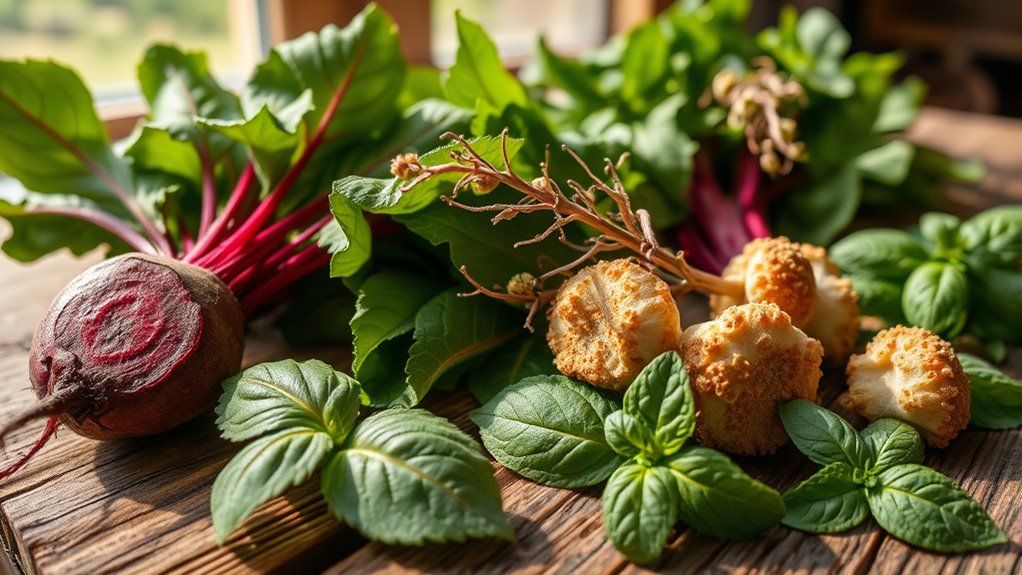
While herbs can boost your exercise performance, they also carry potential risks that you should consider. Herb interactions with medications or other supplements can cause unexpected effects or reduce effectiveness. Some herbs may lead to allergic reactions or gastrointestinal discomfort. It’s vital to assess supplement safety, especially if you have underlying health conditions or are pregnant.
Be mindful of:
- Herb interactions with prescription drugs
- Possible side effects like dizziness or nausea
- Overdose risks from high doses
- Lack of standardized dosages and quality control
Always consult a healthcare professional before adding new herbs to your routine. Staying informed helps you enjoy the benefits safely and reduces the chance of adverse effects.
Success Stories and Practical Applications
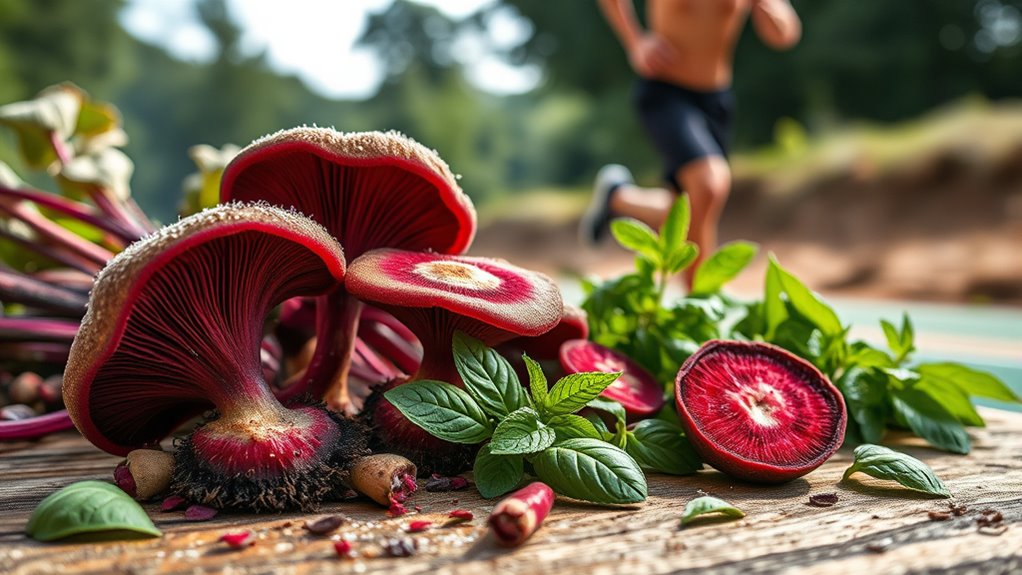
Many athletes and fitness enthusiasts have experienced real benefits by incorporating herbs into their exercise routines. For example, switching to plant-based diets with herbal teas like ginseng or cordyceps can enhance stamina and recovery. Practical applications include sipping herbal teas pre-workout to boost energy or adding beetroot powder to smoothies for improved endurance. Success stories highlight improved performance and quicker recovery times. Here’s how some herbal strategies work:
| Application | Benefit |
|---|---|
| Herbal teas before workouts | Increased energy and focus |
| Beetroot supplements | Enhanced endurance |
| Plant-based diets | Faster recovery and reduced inflammation |
| Cordyceps intake | Improved oxygen utilization |
| Incorporating herbs into meals | Better overall performance |
Future Trends in Herbal Supplements for Exercise
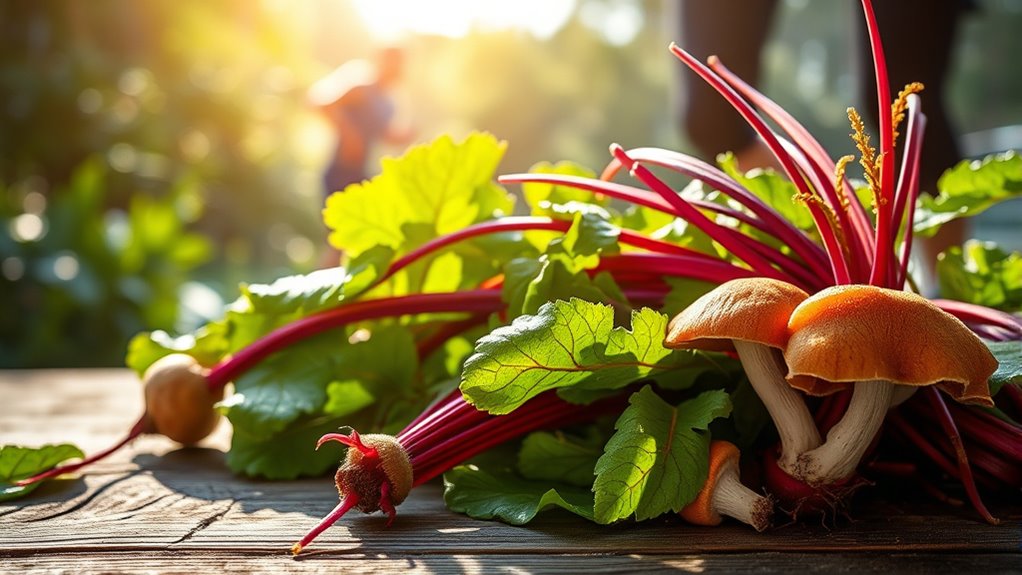
Emerging trends suggest that herbal supplements will become more personalized and technologically integrated to enhance exercise performance. You can expect tailored formulations based on your genetic makeup, lifestyle, and health goals, supporting holistic health. Advances in herbal sustainability will encourage sourcing herbs ethically and eco-consciously, ensuring long-term availability. Technology will also enable real-time monitoring of supplement effects, allowing adjustments for maximum benefit.
Consider these future developments:
- Custom blends designed via genetic testing for optimal results
- Smart supplements linked to fitness trackers for feedback
- Eco-friendly cultivation practices prioritizing herbal sustainability
- Virtual consultations integrating herbal expertise and personalized plans
These trends promise a deeper, more effective connection between herbal supplementation and your fitness journey, emphasizing holistic health and environmental responsibility.
Frequently Asked Questions
Are There Any Age Restrictions for Using Herbal Supplements in Sports?
Yes, there are age limitations for using herbal supplements in sports. You should consider herbal safety and consult with a healthcare professional, especially if you’re under 18 or over 60. Younger athletes may experience different effects, and older adults might have underlying health conditions. Always check for age restrictions and dosage guidelines to guarantee safe use, and avoid self-medicating without proper guidance.
How Do Herbs Interact With Common Athletic Medications?
Herbal synergy can enhance your athletic performance, but you need to watch for medication interactions. Some herbs, like ginseng or garlic, may boost or interfere with common medications such as anticoagulants or blood pressure drugs. Always consult your healthcare provider before combining herbs with your medications, as they can cause unexpected effects or reduce medication effectiveness. Being aware of these interactions helps you stay safe while optimizing your athletic goals.
Can Herbal Supplements Replace Traditional Sports Nutrition Strategies?
Herbal supplements can’t fully replace traditional sports nutrition strategies because natural options often lack the precise, proven formulations of synthetic products. While herbs offer ethical benefits and natural appeal, they may not deliver the consistent, scientifically backed results you need for peak performance. Relying solely on herbs might overlook essential nutrients, so it’s best to use them as complementary tools rather than complete substitutes for well-balanced, evidence-based sports nutrition plans.
Are There Any Long-Term Health Concerns With Herbal Supplementation?
Long-term safety concerns with herbal supplementation are generally low if you follow recommended doses, but you should be cautious. You might develop herbal dependency, relying on supplements instead of building lasting healthy habits. It’s best to consult a healthcare professional before continuous use, especially over years. Regularly monitoring your health helps guarantee safety, and diversifying your approach can prevent potential adverse effects linked to prolonged herbal use.
What Are the Best Herbal Combinations for Enhancing Athletic Performance?
You should explore herbal combinations like beetroot and cordyceps for athletic boosts, as their natural synergy can enhance stamina and recovery. Studies show supplement safety is essential, so choose reputable sources. Combining adaptogens like ashwagandha with energy-boosting herbs such as ginseng can optimize performance without side effects. Always consult a healthcare professional to tailor these herbs to your needs, ensuring safe and effective results.
Conclusion
Incorporating herbs like beetroot and cordyceps can boost your endurance and recovery, giving you an edge in your workouts. Did you know that studies show beetroot supplementation can improve exercise performance by up to 16%? As you explore these natural options, remember to balance benefits with potential risks. With the right approach, herbs can become a powerful part of your fitness journey, helping you reach new heights naturally and effectively.



